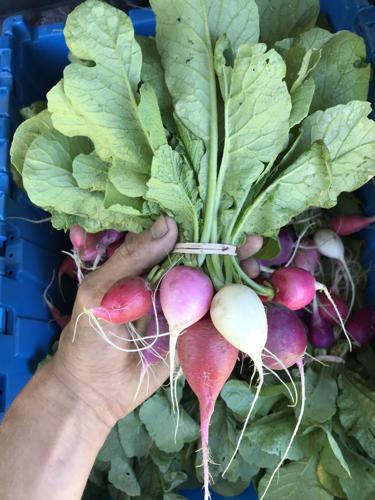For entrepreneurs like Justin Hancock and Jen Sample, the startup life looks different. Instead of offices, they lease a few acres of farmland. And their business, quite literally, is growing.
During their first year of running Wando River Farm, a small-scale farming operation in Awendaw, the couple grew about 40 different crops.
In 2020, they plan to raise even more with help from a South Carolina program for agricultural startups. Wando River Farm was one of five businesses in the state to get $5,000 in funding from the state's Agribusiness Center for Research and Entrepreneurship, or ACRE.
The S.C. Department of Agriculture founded the initiative in 2018 to help entrepreneurial farmers learn business skills and connect with resources.
"South Carolina's agribusiness sector needs innovators and risk-takers who are well-grounded in business principles," agriculture commissioner Hugh Weathers said in a recent announcement about the program.
Farmers like Hancock and Sample learned business planning, marketing and other basics through the program's curriculum. They then competed with 14 other participants for funding awards.
Hancock and Sample plan to use their funding to invest in the tools, supplies and infrastructure they need to scale up operations.

Wando River Farm is a small-scale farming operation in Awendaw. Provided/Wando River Farm
They plan to triple the size of their community-supported agriculture, or CSA, program which provides a weekly supply of produce to customers who pre-pay before a harvest. They also hope to start selling at the Mount Pleasant farmers market for the first time.
"We're young farmers just trying to bootstrap our operation," Hancock said.
On their website, Wando River Farm advertises a commitment to "sustainability and good vibes." They also tout growing practices that don't use synthetic chemical fertilizers or pesticides, and Hancock said they do most work by hand.
For their first season, they cultivated about a quarter of an acre. They're looking to expand to half or three-quarters and, eventually, a full acre.
Hancock said he sees the grant as a "jump start" that can help make their business profitable more quickly.
One of the other grant recipients, Patchwork Farm in Saluda, plans to launch an educational program that would allow students to adopt a cow on the farm and follow it virtually from their classroom.
Another, a produce farm in the Upstate, plans to use the funding to build a mobile farmers market that would serve "food deserts," communities without access to a nearby grocery store.
Woodland Valley Mushrooms, a gourmet mushroom farm in Aiken County, will use the grant to expand its market.
And CHI design studio, a Midlands company that makes hand-dyed indigo textiles, was awarded a grant to continue its educational outreach.
For Hancock, farming was something he would daydream about while working as a graphic designer. He'd always had a passion for food and spent his early 20s working as a line cook at Charleston restaurants.
Sample, who had been operating Holy City Barber on upper King Street, took the career leap first by joining Lowcountry Local First's Growing New Farmers program, which prompted Hancock to join, too.
Through that program they found a "community of young farmers who were willing to share their knowledge and resources," Hancock said. He apprenticed at Lowland Farms on Johns Island for a year to learn about growing and managing a variety of vegetables.
Then, in the spring of last year, they found a small farm in Awendaw to lease and ran a trial run of their CSA program while still working other jobs. Any money they made was reinvested back into the farm, Hancock said.
Though their operation is small, Hancock said they focus on diversifying what they grow. In their first year, they grew what Hancock described as "Southern staples" like collards, okra, potatoes and onions as well as special varieties of herbs, carrots, radishes, kale and other vegetables.
Hancock utilizes his graphic design background and his food and beverage experience for the business. He created the farm's website and logo, and he and Sample sell their crops to a few local restaurants.
Hancock described their farming as "chef-driven." In the year ahead, Hancock said they're interested in trying to grow some edible flowers to sell to restaurants.
"We're small-scale, so we try to do a small amount of everything and focus on the crop," he said. "We really believe in the power of small, local farms."












